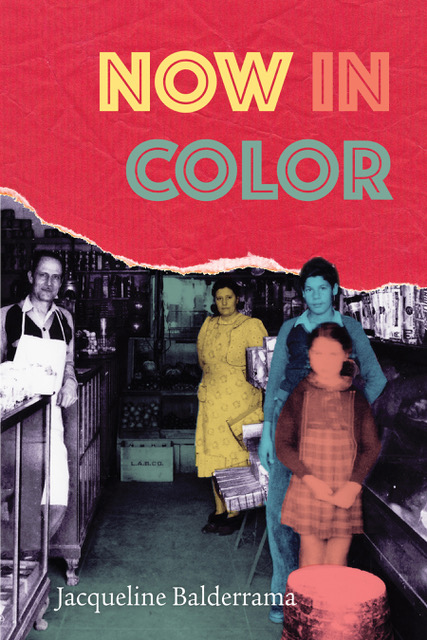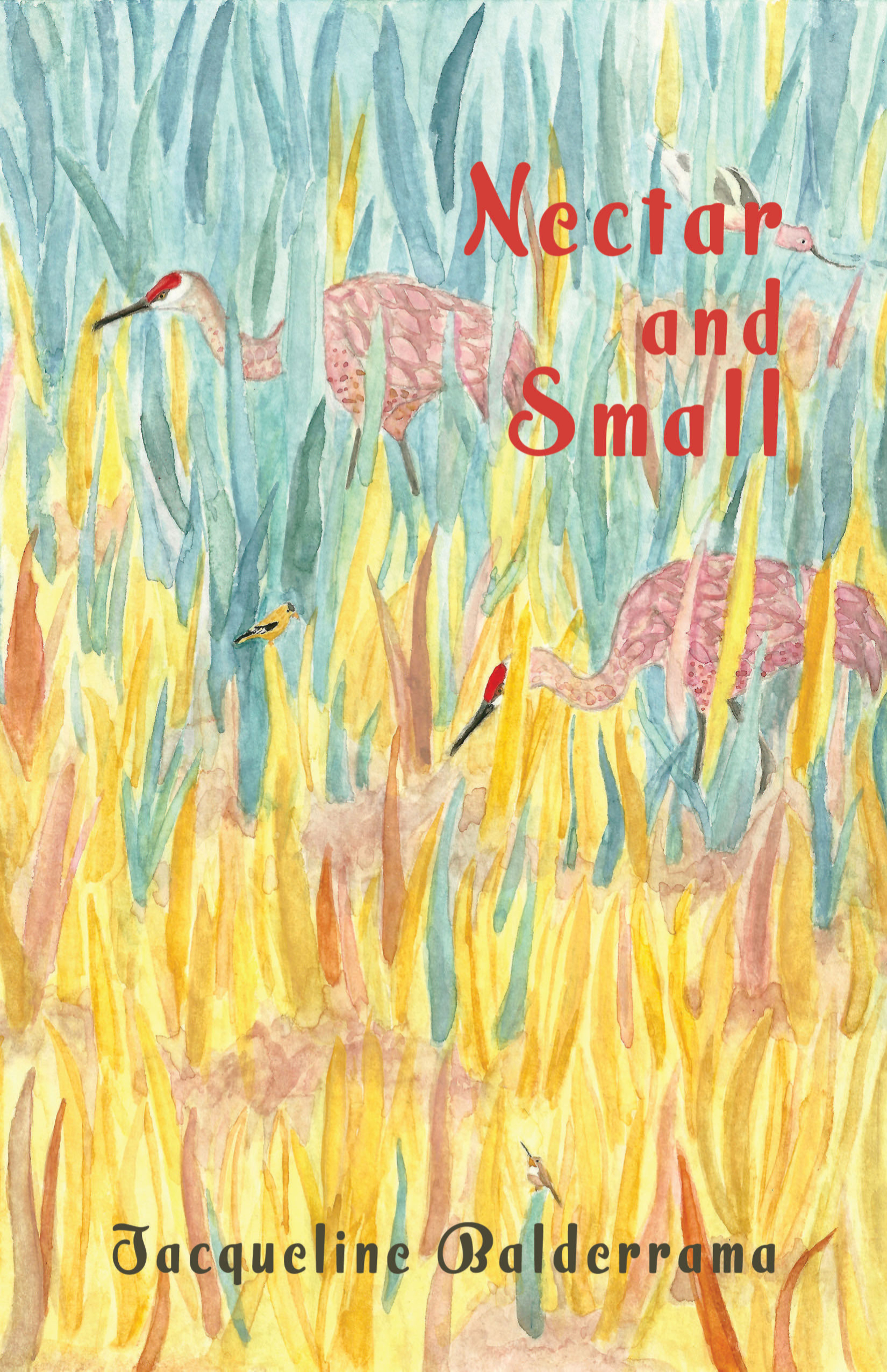Now In Color
Winner of the Perugia Press Prize, 2020

Selected Poems:
Now In Color explores the multigenerational immigrant experience of Mexican-Americans who have escaped violence, faced pressures to assimilate, and are now seeking to reconnect to a fragmented past. These poems illuminate the fluidity of language and of perception through both small hypocrisies and real atrocities. One of Balderrama’s strategies is to use the development of motion pictures and Technicolor as a lens through which to examine personal and cultural histories and stereotypes. She also considers bilingual expectations through an innovative series of Spanish definition poems. Balderrama documents pieces of her family’s oral tradition and draws connections to ongoing injustices experienced by current migrant families, offering a living picture of a present inevitably tied to and colored by its past. Through the poetics of witness, ekphrasis, portraiture, and family mythos, Now In Color deepens our understanding of hybrid identities and calls attention to those impacted by tensions along the U.S.-Mexico border.
Finalist Listings:
Eric Hoffer Book Award in Poetry—Honorable Mention (2021)
Crab Orchard Series in Poetry 1st Book Award (2019)
Pleiades Press’s Editors Prize (2019) and Lena-Miles Wever Todd Prize (2019)
Praise for Now in Color:
In Now in Color, things are rarely as they seem: a legislative apology, say, or the 1914 film The Life of General Villa, which spliced together re-enacted and actual footage of the Mexican Revolution, or starlet Rita Hayworth preserving only part of her given name, Margarita Carmen Cansino. Balderrama’s imagination lingers between what we think we know and a lush vision of what we may have lost. That savy, stratified attention also drives two series—Spanish words defined via rich personal image, and twenty Picasso paintings that prompt another man’s ardent self-reflections. Always, this poet sees the “names which are not names,” showing us what else language can contain—and release. —Sally Ball, author of Hold Sway
“One fellow asks, What are you? / He means why are you brown.” These poems are a heartfelt artful wrestling with self, representation, place, allegiance, food, and so much more as the smallest of details grow into art, love, sacrifice, and family. These are not poems about winners or losers, but about the longer, overarching sense of living in general. The poems work to understand living itself as a gift, reaching for its celebrations and triumphs, even, and especially, where they don’t always at first seem evident. Though often quiet—a side of things we don’t easily pay attention to—these poems are pure 21st century grappling with ethnic identity as it moves into everyday life. —Alberto Ríos, Arizona’s Inaugural Poet Laureate
For Jacqueline Balderrama, identity is an “accounted nothingness.” It is an unrecovered reel of the two sides of Rita Hayworth: one, a long-name Hispanic, the other, a silver-screen ether. It is a Mobius double-sided ribbon of family remembrances, borderland maps, suffering treks across the blistering earth, and a text to “collect what is scattered.” Enter Picasso’s circus scenes, Kahlo’s ripped chest dangling, Varo’s multi-dimensional floating woman, Monet’s crumbling fertile bridge, da Vinci’s moon ocean. This is the real-to-unreal figure, the lost movie, the outsider’s invitation to escape together into her Technicolor vortex of fractured meditations and, most of all, her art of becoming. Now in Color is wild and radical in form, iridescent in blood and genre. —Juan Felipe Herrera, Poet Laureate of the United States
Nectar and Small Chapbook
Finishing Line Press, 2019

also available at: King’s English Bookstore / Barnes&Noble / Amazon
Nectar and Small offers entry into the small nature of backyards and storm drains, bird encounters and beach toys swept away. Here, Jacqueline Balderrama examines the quiet presence of shared inhabitants, presence too of encroaching waste. These twenty-seven, free verse poems celebrate the discovery of nature’s detail and interconnectedness. This is especially true for the series of bird poems woven throughout the collection where species glimpsed in the grasslands of Centennial Valley, Montana defy boundary with disappearance or vast migration. In tandem, Nectar and Small addresses moral dilemmas by confronting individual consumerism and admitting domestic struggles to reduce. Balderrama points to our capacity to appreciate the world around us instead of fear or dismissal, a careful attentiveness toward what so many, human and nonhuman, name home.
Praise for Nectar and Small:
“Jacqueline Balderrama has done just what the founders of the Taft-Nicholson Center were hoping for when they created a place where writers and artists and scholars and students might experience wilderness. The lovely poems in Nectar and Small abound with the wonders to be found there – hummingbirds, sapsuckers, hawks, sandhill cranes. I’m particularly intrigued by the questions they inspire her to ask: ‘Will we ever be allowed this kind of being?'” –Jacqueline Osherow, author of My Lookalike at the Krishna Temple, Ultimatum from Paradise, and Whitethorn
“Jacqueline Balderrama’s poems bore down into the earth to show the great human erasure of our earth, our birds, our water, our trees. But from that deep and dark well, she draws forth the thing humans are best at: making beauty from absence. Like a heron’s wing furled and then unfurled, Balderrama’s poems reveal the stark beauty of this world as it disappears and then, through this grace-giving language, appears again.” –Nicole Walker, co-author of The After-Normal: Brief Alphabetical Essays on a Changing Planet, author of Sustainability: A Love Story, and Where the Tiny Things Are: Feathered Essays
“Part memoir, part bird guide, Nectar and Small traces an ever-shifting landscape from California to Montana, where hummingbirds migrate, valley towns are flooded, and hawks vanish, taking flight. Jacqueline Balderrama has given us a map, not only of marshes and mountains, but of compassion and curiosity stretched across them. The urban and natural worlds intermingle as trees are glimpsed through a chain-link fence and a couple avoids single-use plastics. “Something will emerge from the soil,” the speaker contends, contemplating decay, and what emerges are these deeply perceptive and quietly intrepid poems.” –Adam Giannelli, author of Tremulous Hinge